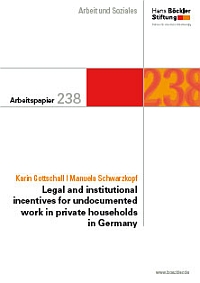 Legal and institutional incentives for undocumented work in private households in Germany
Legal and institutional incentives for undocumented work in private households in GermanyPrivate households' demand for support in housekeeping, childcare and care of elderly is increasing. In Germany, it is met mainly by undocumented work.
The report shows that this constellation is eased by legal and institutional regulations: Social as well as tax legislation promote a marginal employment of married women. Restrictive rules for additional earnings in the social welfare law and high charges on low wage incomes are often a hindrance to the improvement of welfare recipients' and low-paid workers' precarious economic situation by regular work. Foreigners from a non-EU member state eventually have - due to restrictive immigration legislation - few possibilities to take up legal work in Germany. The interest in regular work might be raised (i.a.) by an increase of the upper limits on additional earning and the promotion of employment which ensures livelihoods in domestic services.
Publication:
Gottschall, Karin; Schwarzkopf, Manuela, 2011: Legal and institutional incentives for undocumented work in private households in Germany. Stocktaking and problem-solving approaches, 238/2011, Düsseldorf: Hans-Böckler-Stiftung
Further information and order of the working paper:
Hans-Böckler-Stiftung
Contact:
Prof. Dr. Karin Gottschall
SOCIUM Research Center on Inequality and Social Policy
Mary-Somerville-Straße 5
28359 Bremen
Phone: +49 421 218-58595
E-Mail: karin.gottschall@uni-bremen.de











